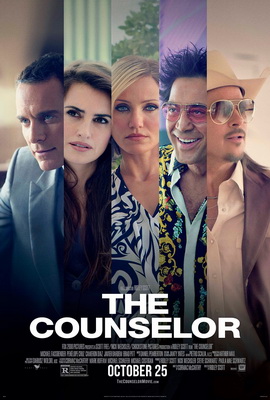So on its first weekend in my neck of the woods, I caught Ridley Scott’s new film The Counselor, with the screenplay being by none other than the great Cormac McCarthy, finest novelist of our times: It was a, um, horrible experience. Not for the faint of heart, as they say. The ending is a gut-wrenching kicker. A shocker, although you do see it coming. Not horrible as in bad or badly done, but horrible as in sheer horror. As I don’t like to give too much away when a film debuts like this, and be forced to inject the ol’ Spoiler Alert, I’ll try to keep my comments on the analytical-but-not-revealing level:
Cameron Diaz, who is not exactly one of my favorite actresses, actually does a knockout performance as the wicked vamp, Malkina. Watch out for her. McCarthy often has a character who embodies some kind of evil, and in this case it’s a woman, Diaz, which is a twist for him. It also probably has the most sex and sex-related talk than all of his novels (I know, this is a film, and maybe that’s why), though there’s some great sex-related moments in Suttree (1979). (I once titled a story “The Witch of Fuck,” from a line in Suttree, and the journal that published it leaned on me heavily to change the title, which I did, and which now appears in my new book of stories The Lousy Adult as “The Next Worst Thing,” published just this month.)
Javier Bardem is one of the kookier, more enjoyable characters, and he should have given more time on screen. Brad Pitt, another actor I’m not thrilled with, does a great job as a hipster/cowboy drugworld entrepreneur, but you won’t like his final moments. Basically everything good in this world goes bad. Before I saw it I thought it sounded like No Country for Old Men II, and now that I’ve seen it, I think that’s fairly accurate. Michael Fassbender is good, but his character is somewhat limited. Greed does him in, but it’s also complicated by love: In his zeal to shower his love, Penelope Cruz, with a “cautionary diamond” (there’s a good scene at a diamond merchant’s office in Amsterdam), he gets in over his head, and gets involved with the wrong people. To say the least.
But The Counselor does raise an aesthetic question: Can a story be too horrible? I think the answer is Yes. My wife says I owe her one for taking her to a movie depicting such despicable behavior, and for its violence to women. I like Ridley Scott’s films, and I imagine this one will become notorious. For instance, at one point the story swerves to a discussion of “snuff films,” which is perhaps a definition of something too horrible to watch, and unfortunately, even though The Counselor is fiction, it’s tainted by that proximity to something as disgusting and sadistic as a “snuff film.”
My favorite part concerns another element of proximity: that of the nearness and elbow-rubbing of great wealth with great depravity. The diamond dealer is right is his soliloquy on “cautionary diamonds”: There are certain objects of desire, like a 3.5 carat diamond, that create entanglements you can’t comprehend, what people will do for money, or what great evil great amounts of money can encourage. Set in El Paso, Texas, with some tangential scenes in Juarez, Mexico, and London, The Counselor is a 21st century morality tale. A series of stylish interiors bought with dirty money (or so it’s implied by the film’s end) contrasts with the dry, bleak landscape, and combined, the images create a kind of frightening poetic backdrop. If you can stomach it, this is a film you have to see.

- October 2023
- September 2023
- September 2021
- April 2020
- September 2019
- May 2019
- August 2018
- February 2018
- January 2018
- October 2017
- August 2017
- June 2017
- May 2017
- March 2017
- February 2017
- November 2016
- October 2016
- May 2016
- April 2016
- March 2016
- February 2016
- January 2016
- November 2015
- October 2015
- September 2015
- June 2015
- May 2015
- April 2015
- March 2015
- December 2014
- September 2014
- August 2014
- May 2014
- March 2014
- February 2014
- January 2014
- December 2013
- November 2013
- October 2013
- September 2013
- August 2013
- July 2013
- June 2013
- May 2013
- April 2013
- March 2013
- February 2013
- January 2013
- December 2012
- November 2012
- October 2012
- September 2012
- August 2012
- July 2012
- June 2012
- May 2012
- April 2012
- March 2012
- February 2012
- January 2012
- December 2011
- November 2011
- October 2011
- September 2011
- August 2011
- July 2011
- June 2011
- May 2011
- April 2011
- March 2011
- February 2011
- January 2011
- December 2010
- November 2010
- October 2010
- September 2010
- August 2010
- July 2010
- June 2010
- May 2010
- April 2010
- March 2010
- February 2010
- January 2010
- December 2009
- November 2009
- October 2009
- September 2009
- August 2009
- July 2009
- June 2009
- May 2009
- April 2009
- March 2009
Recent Posts
- Aliens Among Us: Probing Hillbillies and Freaking Shut-ins, How Netflix’s “Encounters” and Hulu’s “No One Will Save You” Prep Us for the Coming Alien Apocalypse, Kind of
- My Life as a Bob Odenkirk Character: On How Watching Netflix’s Black Mirror episode “Joan Is Awful” Mimicked My Experience of Watching the AMC series Lucky Hank
- “Bobcats, Bobcats, Bobcats”: Animal Life and a Tribute to “Modern Family”
- “The North Water”: This Ain’t Your Daddy’s Moby Dick
- Day 25: On David Quammen's "Spillover": Terrific Book That Foretold Our Pandemic, Kind of
Recent Comments
No comments to show.
